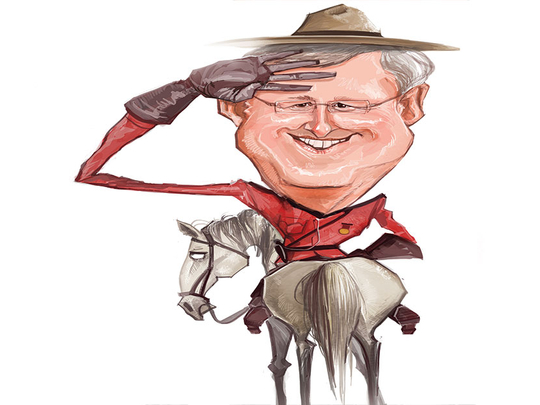
There's one thing that defines Canada — it’s hockey. That’s ice hockey to you and I — hockey, plain and simple to Canadians. It’s the national sport, the national religion, the national obsession. And there’s nothing Canadian Prime Minister Stephen Harper likes more than to be photographed rink side, wearing a hockey shirt, being one of the people.
And there’s nothing more that Harper likes when it comes to politics — his other obsession, his religion, his sport — than controlling his carefully crafted image.
He has been Prime Minister of Canada since 2006 and, following his decision to call a general election for October 19, he hopes to secure a fourth consecutive term in power in Ottawa for his Conservative Party.
And in the past nine years, he and his carefully controlling nature, has single-handedly changed the course of Canada, its outlook on the world, its social conscious, the very fabric of what it means to be Canadian.
He governs by memo.
If you want to talk to him, biographer Paul Wells notes, best prepare a double-spaced two-page brief. He’ll read it and make careful notes in the margin — those notes invariably become policy, de facto and de jure.
On one occasion, Harper wrote notes in a memo noting that Canada Post should issue a commemorative stamp for the Canadiens, the Montreal hockey team that represents every good for French Canadians — or bad, if you’re a long-suffering Maple Leafs fan — about Quebec. A note came back that the prime minister shouldn’t make recommendations and that Canada Post needed to be above politics. Note in margin of memo: “I don’t care. I want the stamp,” he reportedly penned.
Another note came back suggesting that the PM keep a hand’s-off policy, and that the stamp was something Canada Post would probably do on its own anyway. And his reply: “Who is not reading my comments?” The stamp was issued.
What this anecdote shows in the manner in which Harper has personalised politics, turning it into a blood sport where individuals who stand up are pushed aside and marginalised. It has happened to statisticians, judges and public servants who have felt the mantle of his control of the federal government.
Negative campaigning
Under Harper, Canada has made a decidedly right turn. In the bad old days when George Bush was in power in Washington, Harper was viewed initially as Bush-lite. Now, after three consecutive administrations, Canadians might be happy to settle for George instead.
Under Harper, Canada has not only moved to the right in almost every area of policy but has entered an era of highly calibrated, money-driven negative campaigning at odds with the courtesy that is one of the most attractive of Canadian qualities.
Indeed, thanks to his deliberate policy of politicisation, his Conservatives head into the current election campaign better funded than either the New Democrats, led by Thomas Mulcair, and the Liberals under Justin Trudeau.
And those party coffers are being used to broadcast attack ads that are, well, very un-Canadian, mocking Trudeau as not being up to the job of running Canada, and finishing with a quip: “Nice hair though.”
Domestically Harper has moved Canada away from its social democratic tradition, reducing government spending and services, privatising government agencies, cutting public health. He has gagged government scientists and civil servants, is bringing in new internal security laws, and made Canada a less open society.
Internationally he has made the Canada that begged to differ with Britain on Suez, and Vietnam with America, and the Canada that was a pillar of peacekeeping and the United Nations a distant memory. And his particularly passionate identification with Israel has lost Canada the “honest broker” status that it arguably enjoyed in the Middle East in the past.
It used to be that American backpackers put a Canadian flag on their backpacks when hitch-hiking across Europe. Now, that flag is no guarantor of neutrality.
That he has opted to select the October 19 election date speaks to his current predicament. He’s hoping Canadians will get tired of the campaigning over the next ten weeks, and will simply tune out — a low turnout would suit him nicely, given that current polls place his Conservatives only slightly ahead in a three-way race with the New Democrats and Liberals.
In the past nine years, Harper has portrayed himself as a prudent manager of the economy. Now, given low oil price, a low Canadian dollar, climbing unemployment and high levels of consumer debt, that appears to be his Achilles heel. But both Mulcair and Trudeau lack true experience both at the provincial and federal level. And with a long campaign, Harper is hoping that both will have ample opportunities to become unstuck.
If he wins the October election, he’ll be the first political leader in more than 100 years to win a fourth term. Maybe then he can order a commemorative stamp of his smirking face.








